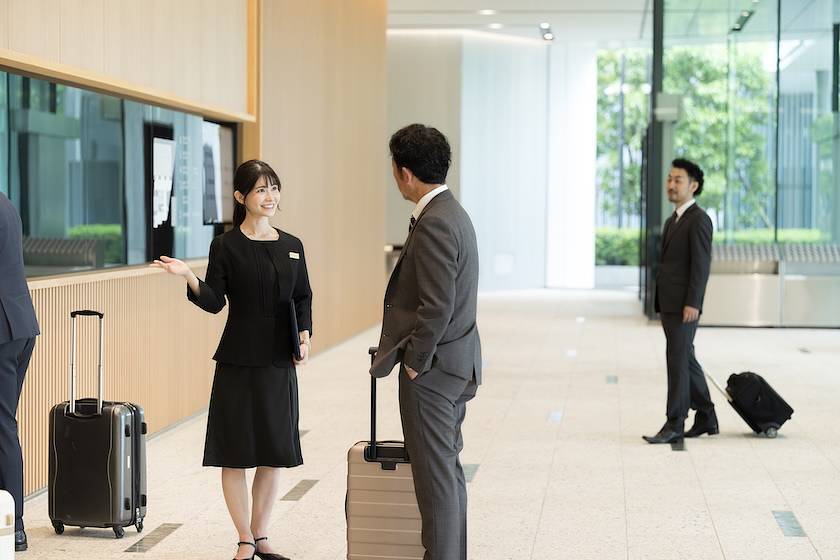Simple stays for work trips
Japanese business hotels are compact, clean, and budget-friendly, making them suitable for short stays or work trips. They provide essentials such as Wi-Fi, private bathrooms, and easy train access. Rooms are modest, yet the experience is efficient and comfortable, offering travelers a practical base in many Japanese cities.

Business Hotels: Key Details
Detail |
What can you generally expect from a business hotel |
Typical price range |
|
Bathroom |
|
Amenities |
|
Check-in / out |
|
Payments |
|
Language support |
|
Best for |
|
Where common |
|
Booking window |
|
Cancellation |
|
What to Expect from a Business Hotel
Rooms in business hotels in Japan usually measure 12 to 18 square meters. They are compact but functional, with a bed, desk, and private bathroom. Privacy is adequate, though older hotels may have thin walls. The atmosphere is quiet and professional, with polite staff and growing use of self-check-in kiosks.
.jpeg)
Shared facilities are modest, often limited to a lobby, coin laundry, and vending machines. Some hotels offer breakfast areas or a sento, where guests must follow bathing etiquette and dining rules.
Who are Business Hotels For?
A business hotel Japan stay is ideal for solo travelers, professionals, students, and couples on short trips. Rooms are compact, so not ideal for families.
Many chains offer women-only floors and secure access, great for solo female guests. Most urban hotels have elevators, but very budget ones may lack accessibility.
In cities like Tokyo and Osaka, business hotels are tourist-friendly with English signage. In rural areas, English is limited, so basic Japanese phrases are useful.

What Are People Saying About Business Hotels in Japan
“They are fine. They’re not great, not terrible, they’re just fine.” Reddit
“The rooms are usually quite small, so are the bathrooms. This is one of the most common features … we did manage quite fine in every one of them.” Hit the Road Ket
“Rooms are small but it’s very modern, clean and new. Walking distance to the metro." tripadvisor.com
Pro Tips
Book early during cherry blossom season, Golden Week, or autumn, as rooms fill quickly.
Pack light since rooms are small, and use luggage forwarding for large bags.
Use the coin laundry, which is convenient for longer multi-city trips.
Carry coins for vending machines and laundry, as some may not take cards.
Keep noise low at night because the walls in some hotels can be thin.
Check whether the hotel has elevators if accessibility is important.
Follow public bath rules, including tattoo coverage and gender-specific hours.

What to Wear at a Business Hotel
Casual clothes are fine for check-in. Most business hotels Tokyo options provide in-room pajamas and slippers — wear only inside your room.
Public bath? Wash before entering. No swimsuits. Cover tattoos if needed. In cooler months, wear layers in common areas.

Where to Find Business Hotels
Tokyo
Shinjuku/Shibuya: This area offers nightlife and quick transport, making it a convenient choice for a business hotel Tokyo visitors may select.
Tokyo Station: A central hub for Shinkansen day trips, it is ideal for travelers who want accommodation close to the station.
Ginza: Known for shopping and dining, this district includes the Osakini business hotel Ginza, offering both comfort and location.
Asakusa: With its temples and traditional atmosphere, it offers a cultural setting for travelers seeking a more traditional stay.
Osaka
Umeda: This district is a central business hub with offices, shopping centers, and dining options.
Namba: This lively area combines business facilities with entertainment and nightlife.
Kyoto
Near Kyoto Station: This location is convenient for day-trippers who rely on regional train connections.
Other cities
Sapporo: Business hotels are commonly located near the main station for quick and easy access.
Nagoya: Many hotels are close to the station, offering fast transport links across the region.
Fukuoka: Staying near Hakata Station provides convenience for both work and leisure travel.
Trade-offs
Near stations: These locations provide convenience but may also come with higher noise levels.
A few blocks away: These hotels offer quieter surroundings with reduced foot traffic.
Getting There and Around
Most business hotels in Japan are within a 5–10 minute walk from JR or subway stations. For multi-city travel, a JR Pass offers convenience and savings. Use IC cards like Suica or Pasmo for local transport.
Staying connected is easy with pocket Wi-Fi, and first-time visitors may benefit from Meet-and-Greet for navigating transfers.

Plan and Book
Prefer a classic hotel stay? JapanDen has you covered with convenient options across major areas.
More to Know
Business hotels in Japan began during the postwar boom source, serving salarymen near transit. Today, they attract international travelers. They meet modern safety standards but are suited for short stays. House rules limit cooking and noise, and teens adapt more easily than toddlers.
FAQs About Business Hotels
Q. Are business hotels cheaper than regular hotels?
A. Yes, they cost less and offer just the essentials.
Q. Do business hotels have curfews?
A. Not usually. Doors may auto-lock. Use your key.
Q. Can I stay without speaking Japanese?
A. Yes—in big cities. Limited English in rural areas.
Q. Are business hotels in Japan good for tourists?
A. They're clean, safe, and well-located.
Q. Is there a difference between capsule and business hotels?
A. Yes. Business hotels = private room + bath; capsules = pods.
Q. Do business hotels offer breakfast?
A. Many do, often buffet with Japanese and Western options.
